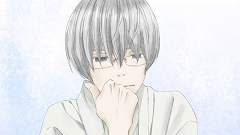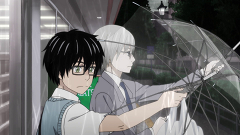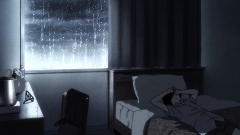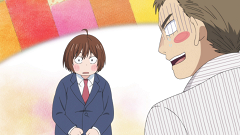If you had to take a wild guess at the atmosphere of these two episodes based on the above screencaps, you’d probably settle on, “Somber, with some levity near the end,” and you’d be exactly right. Given the typhoon that dominated this doubleheader, and the snowy theme associated with Meijin Souya’s character, it fell to Nikaidou and the Kawamotos to inject a bit of color into the proceedings here. That’s not to say that there wasn’t good material in the Rei/Souya match, or their ensuing adventure through storm-stricken Japan, but I got the most joy from watching Nikaidou celebrate after his post-hospitalization victory. While it’s true that 3-gatsu adapts its source manga in a straightforward manner, its careful arrangement of the Souya and Nikaidou matches creates a big contrast not just in style, but in their impact on the series’ protagonist. Rei typically alternates between viewing shogi as a curse and a beacon of salvation, but with these episodes, a new dichotomy emerges. In his match against Souya, shogi is a safe, quiet world unto itself; in observing Nikaidou’s game, it’s a raucous, jubilant affair that reflects the best parts of the real world. As he is right now, I think Rei would describe his ideal game as closer to the first of these options, but I hope that, given time, he’ll pick the latter.
The match against Souya has an odd structure to it, with little time spent over the board, and the game’s conclusion being told to us, rather than shown. I can’t say that I prefer this method, as if Souya is a “final boss” of sorts, we ought to see Rei’s defeat in full, so his eventual victory (hypothetically speaking) would be that much sweeter. But 3-gatsu isn’t a typical sports anime, since it treats the game’s post-mortem as more significant than the match itself. When Souya nods and flashes the slightest of smiles after Rei realizes how he might have moved differently, the show establishes a connection between the two characters, which is both promising and frightening. It’s nice to witness a bit of kinship between the current Meijin and the boy who has been following in his footsteps since childhood, but Souya’s life is a lonely one, and not just because of his position atop the shogi world. We learn in the first of these two episodes that he suffers from intermittent deafness, which forces Rei to act as the adult when they have to find lodging during the typhoon. The Meijin’s silent gazes point Rei in the right direction as they aim to leave the train station, so he’s clearly competent, but when you combine his hearing loss with a detached personality and possible social disorder, he’s also a tragic figure. That Rei is so drawn to him and his solitary existence is just a little troubling, given Rei’s own history of isolation and depression.
Of course, it was good of Kiriyama to care for Souya the way he did, and their cooperation during the storm was fun to watch. Episode 38 even puts a spin on things by reusing footage from the previous episode, but removing all the dialogue, demonstrating again that the two competitors have a certain wordless connection. After the typhoon has passed, Rei continues to think about their match, and even begins to study Souya’s old game records, which this show often uses as a clue that a character has discovered more fun or motivation within shogi. When Shimada delivers the news that Nikaidou is out of the hospital, Rei goes to the hall to await the result of his friend’s match, but continues to study those game records, still absorbed in Souya’s quiet mastery of the game. But as time passes, he sets his papers aside and looks in on Nikaidou’s match for a while, which I was quite happy about, especially since it meant that he caught the moment his opponent conceded. What followed was two minutes of pure exhilaration, as Nikaidou bragged about the new move he’d been working on for ages, and wondered at the top of his lungs whether the tactic would be named after him. Nikaidou wasn’t always a favorite of mine, but it’s tough not to like him when even Rei (who usually brushes off his rival’s weird behavior) bursts into laughter at his antics. Seriously, that scene may have contained his longest and most genuine laugh of the series thus far, and I hope he remembers it for a long time to come. Watching Rei chase the Meijin dream is great, but knowing he’s in for this sort of happy, colorful future is how I hope everything ends someday.




